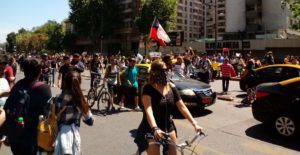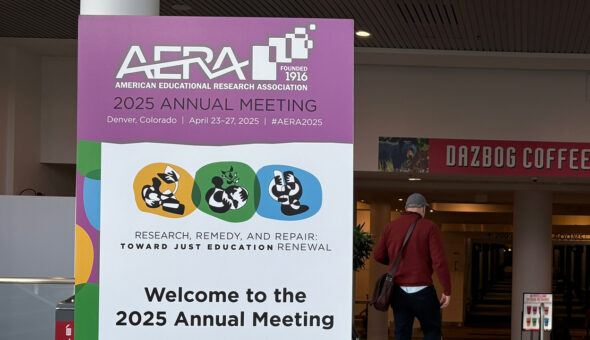
By Natalia Lopez Hornickel, MRes Student, Department of Education
The suggestion of the economy minister Juan Fontaine (the year 2019) - to get up earlier to pay the lowest fare for the Santiago metro passage - was the straw that broke the camel's back. His recommendation was broadcast after the rise of the subway ticket in thirty Chilean pesos (0.05 dollars, approximately). As a result, on October 18, 2019, the social outbreak began in Chile with a series of massive demonstrations.
Evasions and riots led to state repression through police control and violence by the Carabineros (Chilean police), which resulted in 460 victims of eye trauma, 11,564 people injured between October 18 and November 22, 2019 (Human Rights Watch, 2019). Carabineros arrested more than 15,000 people, and abuses were committed against a heterogeneous group of people. Ombudsman for Children collected information on 327 possible violations of children's rights between October 18 and November 15, 2019. Twenty-six deaths on that date were part of the prosecution's investigation (Human Rights Watch, 2019). Today 5 cases of deaths are recognized as the responsibility of State agents. The human damages are uncountable—the biggest crisis of democracy in decades.
Chile is one of the most unequal countries in Latin America (UNDP, 2017). The income of the richest 10% of the population is equivalent to 26 times the gain of the poorest 10% (Matamala, 2016). In this sense, the outbreak shows an evident protest for material equity, where labor and educational demands continued to be the most frequent, and those for health, housing, social security (material aspects), and violence against women were maintained or increased (Somma, Garretón, Campos and Joignant, 2020).
Brieba (2020) asserts that the roots of the social unrest were not univocal. There seem to be at least three substantive demands: dignity, end of abuse, and express oneself in favor of equality. There would be a moral worth by dignity, with a material dimension in which people seek to live with dignity. But also, a relational dimension, which refers to being treated as a subject worthy of dignity (Brieba, 2020). The abuse would come from the elites' vicious use of power to benefit each other. And equality is required in socioeconomic and gender terms (which was revealed in previous demonstrations) and against hierarchical relations exercised by class groups (Brieba, 2020).
This social suffering accounts for the lack of democratic equality. Democratic equality implies that oppressive relationships are avoided, and each person is recognized as a citizen in the public space (Brieba, 2020). At the same time, this social unrest results from the distrust caused by the lack of ethics among those who hold a public position. Continuous uncovering of corruption between political figures, collusions between companies (LaTercera, 2019) added to the recent revelation of new information on tax havens associated with the president (Skoknic and Arellano, 2021).
In this mistrust, it is urgent to find ways that can open the dialogue. Starting, first and without a doubt, with the reparation and care of human rights violations. But, unfortunately, this search for justice has been two years of infertile struggle for many families who still cannot find it.
Creating a new Constitution is encouraging; as long as it makes the navigation chart of a current Chile, it seeks to capture respect and dignity for each person. A challenging task, given that it constitutes an institutional process amid widespread disbelief.
Recognizing that the feeling of desolation is not personal in a society deeply marked by the individualistic resolution of social problems was a turning point. Moreover, it wasn't just about each one. On the contrary, the feeling of suffering from the same system, suffering the same unequal society, led by an indifferent elite and ignorant of its reality, was collective.
However, this openness and awareness towards recognizing inequality must be broad and empathetic, considering gender, sexual diversities, origin, migratory status, and indigenous people. These are all set of characteristics that enrich society. Yet, all these different characteristics are also a target of discrimination. Therefore, it could be essential to include an intersectional perspective (Crenshaw, 1991) that considers the magnitude and effect of belonging to several socially discriminated groups simultaneously.
Seeking a solution through education could result in overloading it. Nevertheless, it seems one of the most coherent paths, given its potential to generate changes. Citizenship education becomes a critical element of constructing spaces that allow democratic and tolerant interactions. As a practice, provide tools so that young people can critically discern, exchange ideas, and generate safe communities for all people (Schulz et al., 2016). And, at the same time, reinforce a formation in which ethics and transparency are the axles. Thus, hopefully, in the future, having people able to lead with these values in mind. In this sense, the evidence has shown that the school can cause significant effects in motivating students to participate and promote democratic ideas and inclusion among them (Carrasco and Irribarra, 2018).
Much to reflect collectively to move forward. And above all, much work to do.
References
Brieba, D. (2020). El estallido social en Chile desde el igualitarismo relacional de Elizabeth Anderson. Revista de Sociología, 35(1), 31-42. doi: 10.5354/0719-529X.2020.58105
Carrasco, D. y Irribarra, D. (2018). Chapter 6. The Role of Classroom Discussion. In A. Sandoval Hernández et al. (Eds.) Teaching Tolerance in a Globalized World. IEA Research for Education 4, https://doi.org/10.1007/978-3-319-78692-6_6
Crenshaw, K. (1991). Mapping the margins: Intersectionality, identity politics, and violence against women of color. Stanford Law Review, 43(6), 1.241-1.299. https://doi: 10.2307/1229039.
Human Right Watch. (2019). “Chile: Llamado urgente a una reforma policial tras las protestas. Uso excesivo de la fuerza contra manifestantes y transeúntes; graves abusos en detención”. Recuperado de https://www.hrw.org/es/news/2019/11/26/chile-llamado-urgente-una-reforma-policial-tras-las-protestas
La Tercera. (2019). (6 de marzo de 2019). Crisis aguda de confianza: Estudio concluye que 8 de cada 10 chilenos percibe que organismos públicos son corruptos o muy corruptos. LaTercera. https://www.latercera.com/nacional/noticia/crisis-aguda-confianza-estudio-concluye-8-10-chilenos-percibe-organismos-publicos-corruptos-corruptos/556941/
Matamala, D. (2016). Poderoso caballero. El peso del dinero en la política chilena. Santiago: Catalonia.
Programa de las Naciones Unidas para el Desarrollo (PNUD). (2017). "Unequal. Origins, changes and challenges in Chile’s social divide". Recuperado de https://www.undp.org
Schulz, W., Ainley, J., Fraillon, J., Losito, B. & Agrusti, G. (2016). IEA International Civic and Citizenship Education Study 2016 Assessment Framework. Springer International Publishing. DOI: https://doi.org/10.1007/978-3-319-39357-5
Somma, N. Garretón, M. Campos, T. y Joignant, A. (2020). Radiografía del “estallido social”. En A. Joignant, N. Somma, M. Garretón y T. Campos (Eds). Informe Anual. Observatorio de Conflictos 2020. Recuperado de https://coes.cl/wp-content/uploads/Informe-Anual-Observatorio-de-Conflictos-2020-COES.pdf?utm_source=Masiva&utm_campaign=0faa426bbf-Semana-3+diciembre_COPY_01&utm_medium=email&utm_term=0_817d666ed4-0faa426bbf-332414781
Skoknic, F. y Arellano, Al. (4 de octubre de 2021). Pandora Papers: documentos de Islas Vírgenes arrojan nuevos detalles de las sociedades de Piñera en paraísos fiscales. CIPER. https://www.ciperchile.cl/2021/10/04/pandora-papers-documentos-de-islas-virgenes-arrojan-nuevos-detalles-de-las-sociedades-de-pinera-en-paraisos-fiscales/
Respond


